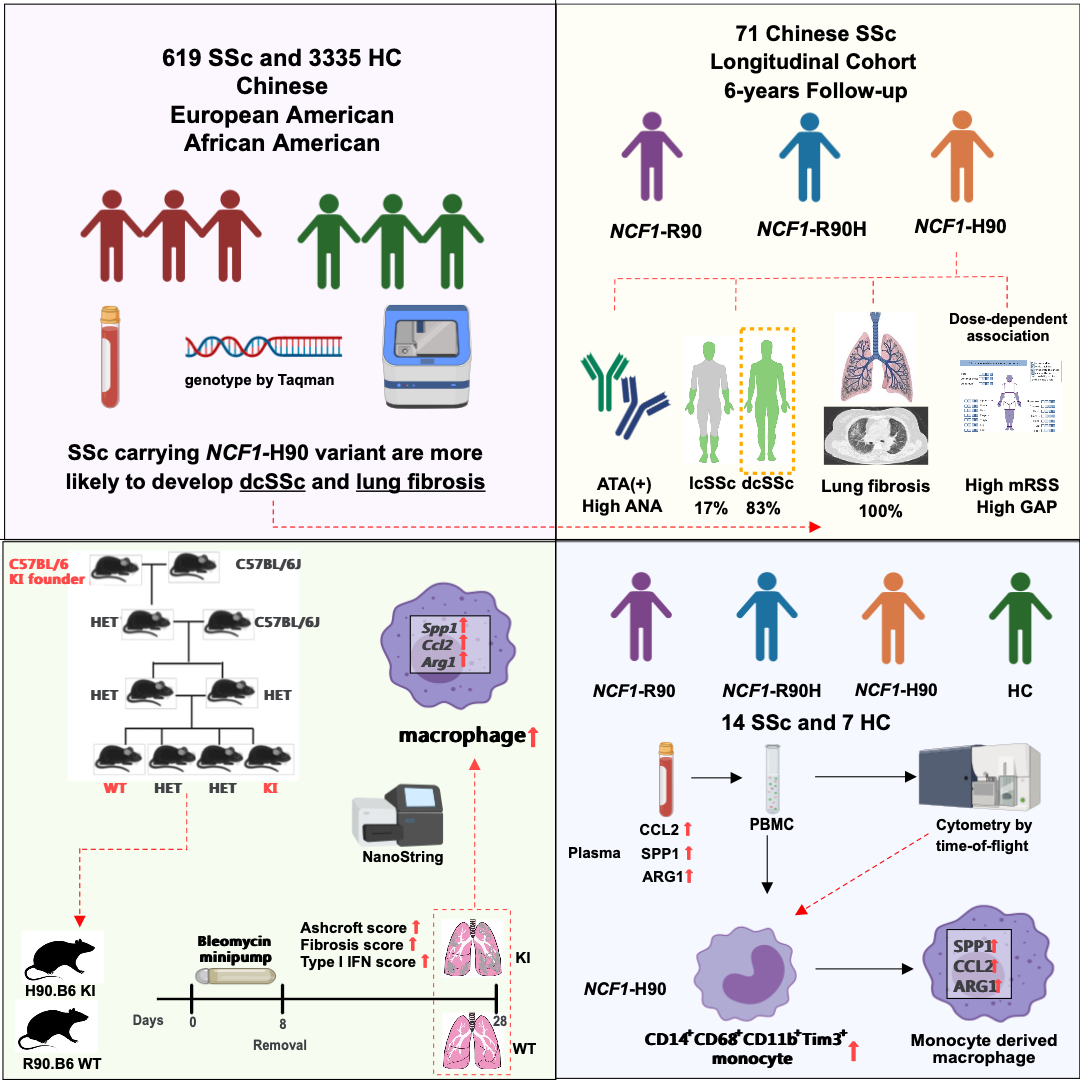Session Information
Date: Monday, November 18, 2024
Title: Abstracts: Systemic Sclerosis & Related Disorders – Clinical II
Session Type: Abstract Session
Session Time: 3:00PM-4:30PM
Background/Purpose: We previously identified a systemic lupus erythematosus (SLE) causal risk variant, p.Arg90His (p.R90H, rs201802880) substitution encoded in neutrophil cytosolic factor 1 (NCF1), an essential component of the nicotinamide adenine dinucleotide phosphate (NADPH) oxidase complex 2 (NOX2), predisposing to multiple rheumatic diseases. We aimed to investigate if the H90 variant increases risk for systemic sclerosis (SSc).
Methods: Association of NCF1.pR90H with SSc was performed in 619 SSc patients and 3,335 controls, and in bleomycin (BLM)-treated Ncf1-R90 C57BL/6 (B6) wildtype (WT) and -H90 knock-in (KI) littermates. We evaluated the association of this variant with clinical manifestations of SSc, including autoantibody, modified Rodnan skin score (mRSS) and gender-age-lung physiology (GAP) index, using a longitudinal cohort of 71 SSc patients. We used cytometry by time-of-flight (CyTOF) to perform cell subset analysis of PBMCs from 14 SSc patients and 7 controls.
Results: The NCF1-H90 variant associated with risk for diffuse cutaneous SSc (dcSSc) in Chinese (odds ratio [OR] = 2.25, P = 4.25 × 10-11) and European Americans (OR = 2.48, P = 2.02 × 10-3), and lung fibrosis (OR = 2.09, P = 7.96 × 10-10) in Chinese SSc patients. Compared with R90.B6 WT littermates, BLM-treated H90.B6 KI mice demonstrated increased pulmonary fibrosis, increased activation of type I interferon inducible genes, elevated expression of Spp1, Ccl2, Arg1, Il6 and Timp1, and enriched macrophage cell-type scores in lung tissues. Compared with SSc patients carrying two copies of R90 variant, homozygous H90 SSc patients had increased incidence of interstitial lung disease (ILD) with elevated mRSS and GAP index, increased anti-nuclear antibody (ANA) titers and anti-topoisomerase antibody (ATA) seropositivity, decreased survival, and elevated plasma levels of osteopontin (OPN, SPP1), CCL2 and ARG1. These H90 SSc patients sustained elevated mRSS during an average 6-year period with decreased survival. The 0, 1 and 2 copies of H90 carriage in SSc PBMCs exhibited a dose-dependent increase in both percentage and number of profibrotic CD14+CD68+CD11b+Tim3+ monocytes. Elevated protein levels of OPN, CCL2 and ARG1 were observed in CD68+CD11b+ monocyte-derived macrophages (MoMs) from H90 patients, and these levels were decreased after co-culturing with anti-CCL2 but not control antibody in H90 MoMs.
Conclusion: The NCF1-H90 variant increases risk for dcSSc, promoting the development of lung fibrosis via expanding profibrotic SPP1+ MoMs in a CCL2-dependent manner, contributing to severity of lung fibrosis in both BLM-treated mice and patients with SSc.
To cite this abstract in AMA style:
Yuan X, Qin X, Takemoto K, Zhao J, Sanderson M, Xu X, L Helke K, Wolf B, Guthridge J, A James J, Zhou X, Assassi S, Feghali-Bostwick C, Wang D, Sun L, P Tsao B. Human NCF1-p.R90H Variant Promotes Pulmonary Fibrosis in the Bleomycin-induced Mouse Model and Systemic Sclerosis Patients via Expansion of SPP1+Monocytes-derived Macrophages [abstract]. Arthritis Rheumatol. 2024; 76 (suppl 9). https://acrabstracts.org/abstract/human-ncf1-p-r90h-variant-promotes-pulmonary-fibrosis-in-the-bleomycin-induced-mouse-model-and-systemic-sclerosis-patients-via-expansion-of-spp1monocytes-derived-macrophages/. Accessed .« Back to ACR Convergence 2024
ACR Meeting Abstracts - https://acrabstracts.org/abstract/human-ncf1-p-r90h-variant-promotes-pulmonary-fibrosis-in-the-bleomycin-induced-mouse-model-and-systemic-sclerosis-patients-via-expansion-of-spp1monocytes-derived-macrophages/

